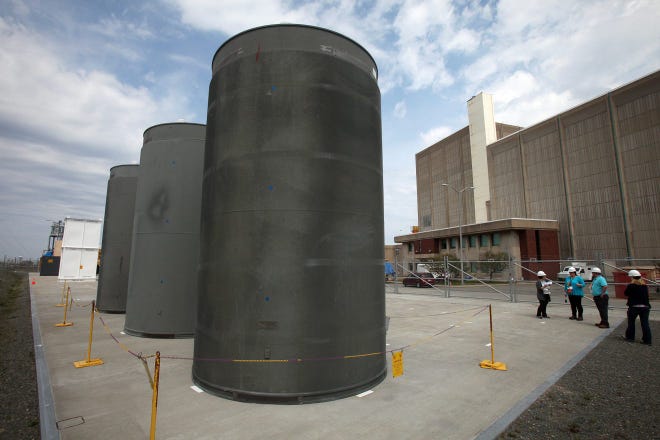'We will never allow the dumping of radioactive waste into Cape Cod Bay'
PLYMOUTH – Holtec International, the company overseeing the decommissioning of the Pilgrim Nuclear Power Station, pledged this past November not to discharge any radioactive wastewater into Cape Cod Bay in 2022, and state lawmakers are using the time to enact legislation that would prevent them from doing so ever.
“We will never allow the dumping of radioactive waste into Cape Cod Bay,” state Sen. Susan Moran, D-Falmouth, told members of the Nuclear Decommissioning Citizen Advisory Panel during their every-other-month meeting Monday, Jan. 31.
Moran, along with state Rep. Matt Muratore, R-Plymouth, and representatives of U.S. Sen. Ed Markey, D-Mass., and U.S. Rep. William Keating, D-Bourne, were on hand during the virtual meeting to share their feelings on the prospect of Holtec discharging up to 1 million gallons of treated radioactive wastewater into the bay. The water would be released in 20,000-gallon batches.
Twin bills in the House and the Senate would add language to a state law that regulates “crimes against public health.” The revised law would prohibit the deposit, disposal or discharge of any solid or liquid radioactive material in coastal or inland waters. Violators would face an initial fine of $25,000 followed by a $10,000 penalty for each subsequent violation.
Holtec’s pledge not to release any water this year came after public outcry following news it planned to do so. The company has two other alternatives for disposing of the water: evaporate it or take it to the company’s storage facility in Texas, where other waste from the plant has already been sent. Each option comes with its own risks and costs.
“Let's be realistic: When dealing with radiation, nothing’s safe,” Muratore said.

More:How spent fuel moves at Pilgrim
What are the options?
David Noyes, senior compliance manager with Comprehensive Decommissioning International, the company partially owned by Holtec that is overseeing the cleanup, told the panel Holtec is evaluating its options.
"No decision has been made," he said. “We’re evaluating all three options. The decision will ultimately be made based in science.”
Although Moran said she wanted to ensure no water is released into the bay, Entergy, the company that owned the plant while it was operating, had regularly done so.
Noyes, a longtime Entergy employee who was a senior manager when the plant closed in 2019, said the two largest discharges over the last 15 years were in 2011 and 2013. Combined, they accounted for 635 gallons. He said the amount of radiation was significantly below Nuclear Regulatory Commission thresholds.
More:LOCAL & STATE MATTERS: Decommissioning the Pilgrim Nuclear Power Station
While Holtec has not released any wastewater into the bay, it has evaporated about 680,000 gallons over the last few years.
Evaporation is generally viewed as more palatable than liquid release, but it is no longer cost-effective because the residual heat from the storage tanks continues to decline with the removal of the spent fuel rods.

"It’s reached a point of diminishing returns, where heat is insufficient to evaporate at anywhere near that rate,” Noyes said. “To evaporate at the previous level would require fossil fuels to generate the necessary heat.”
Panel members had their own concerns about evaporation, noting the released vapors could return the waste elements to the ground or the water through precipitation.
“The effect (of evaporation) might be higher than putting it into the bay,” Nuclear Decommissioning Citizen Advisory Panel member Jack Priest said. “Both are lousy choices.” Priest works for the state Department of Public Health’s radiation control program.
Holtec president weighs in
In letter, Holtec President Kelly Trice said either option is environmentally safe.
“Both methods of discharge are well documented, regulated, and the federal limits that have been set are established based on scientific expert evaluation, public input, and are considered safe for humans and the environment,” the letter stated.
More:Much work remains as Pilgrim Nuclear Power Station moves toward decommissioning
More:Alleged ‘misrepresentations’
That leaves the option of trucking the waste to Holtec’s storage site in Texas.
“This technique involves extensive trucking, risk of vehicle incident, and the water is still processed and discharged in a permitted and safe fashion,” Trice wrote.
That line of thinking didn’t make sense to panel member Mary Lambert, who noted Holtec is already trucking materials to its storage site, both from Plymouth and other closed plants.
“Spent fuel has been trucked all over the country,” she said. “There's been a lot of waste sent to Texas, again with no problems with transportation.”
Although the water issue remains unresolved, Holtec continues to make progress at the plant, including demolition of buildings and other structures and preparation to plant trees near the storage tanks to shield them from neighbors' view.
The company expects to finish its major work at Pilgrim by 2027 in preparation for a partial release of the 1,700-acre property by the Nuclear Regulatory Commission for development or other use. The developed portion of the plant covers 140 acres.
Environmental samples and impact studies are awaiting review and feedback from the state. Those results, which will help shape whatever decision is made, will likely be the main focus of the panel’s next meeting in March.
Brewster resident Mary Waygan, who said she has a master’s degree in environmental science and has worked on lab and field testing, told the panel that containment is the best option.
“Dilution is not the solution to pollution,” she said. "You need to contain it and protect it from dispersement into the general environment.”

No comments:
Post a Comment